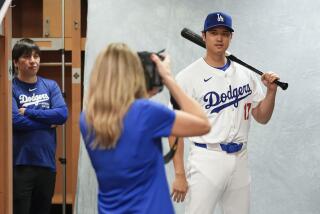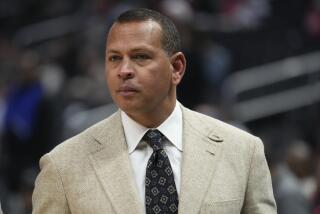Baseball Trying to Digest Androstenedione Debate
- Share via
Baseball and the players’ association, which rarely agree on anything, are jointly zeroing in on the little white pill Mark McGwire made famous and the health and ethical issues it poses for the sport.
Under pressure from the International Olympic Committee to ban androstenedione--as the Olympics, NFL and NCAA have--baseball will open its investigation on two fronts: first at the players’ association board meeting in Las Vegas on Wednesday, then at the owners’ winter meeting in Nashville, Tenn., on Saturday.
At the heart of the talks are worries by doctors that players who use the over-the-counter supplement, which is purported to raise testosterone levels and enhance performance, are risking the long-term effects associated with prolonged steroid use, including a higher incidence of heart and liver disease.
Just as important, from baseball’s perspective, are the ethical issues of whether andro use is a form of cheating and whether it sends the wrong message to young people who look up to McGwire.
“All those issues will be part of our discussion,” said Lou Melendez, lawyer for baseball’s Player Relations Committee.
At least 100 ballplayers in the majors and minors use andro, according to Champion Nutrition Inc. of Concord, Calif., the company that supplies McGwire with his supplements and has endorsement deals with many other players. Yet when asked to name the other players taking andro, the company declined, saying none of them wanted to be associated publicly with the supplement.
In crafting its policy toward andro over the next few months, baseball also will consult with the IOC and the medical directors of all the major professional sports. IOC president Juan Antonio Samaranch, who is preparing for the world anti-doping summit in Lausanne, Switzerland, in February, recently lashed out at American pro sports and, in particular, McGwire for setting “a bad example for youth.”
“It’s impossible for us to intervene in the professional leagues where doping is present everywhere,” Samaranch said. “It’s a big problem. It’s an American problem with a different mentality, different habits, and champions who boast about taking banned substances and become national heroes.”
As baseball’s talks begin, the owners, players and doctors are being particularly careful to avoid tarnishing McGwire’s record of 70 home runs.
“I don’t think he was doing anything that was wrong, or that he knew was wrong, or that other people weren’t doing,” said Dr. Robert B. Millman, medical adviser to the commissioner’s office. “Mark thought of it as sort of a food supplement. And food supplements that you buy in health food stores are fair game for anyone to take.”
Indeed, andro’s classification as a dietary supplement makes it legal, easily available, and within the rules of baseball, which bans only illegal drugs.
Testosterone, the male hormone into which andro quickly converts after ingestion, is a controlled drug requiring a triplicate prescription. Doctors view that difference with alarm, saying the 1994 Dietary Supplement Health and Education Act, which reclassified andro, took a potentially dangerous substance out of medical control.
McGwire, who broke the rookie homer record long before he started taking andro, was unavailable for comment, his agent, Jim Milner, said. In the past, the St. Louis Cardinals slugger has said he’s doing nothing wrong and that he takes only natural substances.
Baseball began its inquiry into andro shortly after The Associated Press reported in August that McGwire had been using it for more than a year. One of the first people commissioner Bud Selig called was Yankee boss George Steinbrenner, also a board member of the U.S. Olympic Committee.
Selig wanted the perspective of Olympic doctors, so Steinbrenner put him in touch with Dr. Don Catlin, a UCLA professor who runs an Olympic drug-testing lab and who helped set up the NFL’s random drug-testing program.
Catlin told Selig that if baseball were serious about banning andro, or any other performance-enhancing substances, the only way to enforce the ban was through a random testing program like the NFL’s.
Sometime before the start of the 1999 season in April, baseball expects to announce its decision on whether to ban andro, discourage its use, or allow it to be taken unchecked. But one thing is almost certain: The players’ association will not agree to random drug testing.
“I can’t imagine the circumstances under which we would do that,” said association general counsel Eugene Orza, who is spearheading the union’s investigation.
Before baseball acts, it wants to see the results of a proposed study by two Harvard researchers, Joel Finkelstein and Benjamin Leder, seeking to find out whether andro really does put the zoom in testosterone.
Along with presentations by Millman and Dr. Joel Solomon, the union’s medical adviser, Finkelstein and Leder will address team doctors, trainers and counselors at the winter meetings, and will seek baseball’s support for their study.
The study would involve 60 male volunteers, ages 20 to 40, who would be divided into three groups. The first group would receive 300 milligrams of andro, the second group 100 milligrams, and the third group would take a placebo. The researchers expect that those taking higher doses would see an increase in testosterone levels.
“Nobody really knows whether in fact it does raise testosterone levels, because it hasn’t been studied in any kind of reputable way,” Millman said. “And then, if it does raise testosterone levels, the assumption is that it improves performance, but nobody has studied that, either.
“In the body, there are all these feedback mechanisms, so you might raise the testosterone level in one way but turn off the natural secretion of testosterone, and end up with no net positive.”
Proponents of andro and similar supplements point to the absence of reported side effects as proof that they are harmless when taken as suggested. The Food and Drug Administration, which monitors “adverse events” on thousands of drugs and supplements, has not had any serious problems reported.
“I don’t understand the controversy,” said Greg Pickett, former Champion Nutrition president who recently started a rival company, CytoSport. “The medical establishment is trying to get andro over, as close as they can, to a steroid-type product. That’s terribly unfortunate, and it’s wholly inaccurate. It is not a steroid, purely and simply. It doesn’t act like one. It doesn’t work like one in the body. It is not an anabolic steroid.
“It’s a misleading statement that they’re doing on purpose,” he said. “Overall, they have a bent against any kind of alternative medicine. What they know about is drugs, and how to help people with drugs. And if it doesn’t fit into that narrow category, it isn’t valuable. There’s a growing amount of evidence that refutes the basic position that these supplements are dangerous.”
Pickett says that andro and supplements like it are “completely natural, healthful products” that simply “support the body’s natural production of testosterone,” and “will not add testosterone, per se.”
Millman agrees that’s possible. He said the benefits of increased lean muscle mass, quicker recovery from workouts and injury, and boosts in strength and power reported by andro users, could be due entirely to a placebo effect or other substances they may be taking, such as creatine, which McGwire also uses.
“Ballplayers take a bewildering array of vitamins and minerals to be able to train better, to be able to play better, to be able to concentrate more,” Millman said. “And the belief systems are profound about the efficacy of these various things. The one thing we’re clear about is that the knowledge here is really incomplete. We just have to get the information.”
If the Harvard study shows andro really doesn’t boost overall testosterone levels, Millman said, that might serve just as effectively as a ban because players probably would stop taking the supplement.
Yet even a finding of significant hikes in testosterone would leave baseball in a quandary, because any harmful effects from andro would probably not be shown for a long time.
“Steroid hormones are unlike almost any other drug we know, in that the adverse effects are usually distant from the time of use,” said Dr. Gary Wadler, a steroid expert and associate professor of clinical medicine at the NYU School of Medicine. “At the same time we’re dealing with young people who have a sense of invincibility to start with. Telling them that something may happen 10 years down the line, to them that’s never.
“But there are serious effects, they’re delayed, and they’re impacting on young people. Yet these hormones are selling like hot cakes,” said Wadler, who will act as an adviser to baseball. “It’s just an inevitability that, as the pool of people who use these steroids increases, there will be a larger number of people who develop side effects. It’s getting more outrageous and disconcerting.”
More to Read
Go beyond the scoreboard
Get the latest on L.A.'s teams in the daily Sports Report newsletter.
You may occasionally receive promotional content from the Los Angeles Times.






